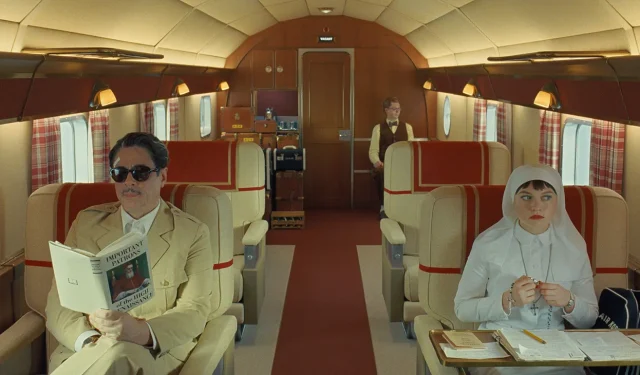The Phoenician Scheme: Wes Anderson’s Return to Form
For fans of Wes Anderson, recent years have presented a mixed bag of experiences. While his distinctive visual storytelling has garnered critical acclaim, the reception of some of his latest works has been lukewarm at best. Following the success of The Grand Budapest Hotel, Anderson’s subsequent films have heightened the quirkiness and meta-textual elements that characterize his unique style. Projects like Isle of Dogs and The French Dispatch sparked debate, often leaving audiences perplexed. His latest feature, Asteroid City, with its eye-roll-inducing premise, and the underappreciated short film The Wonderful Story of Henry Sugar, released shortly thereafter, further demonstrate the divisive nature of Anderson’s artistry.
Nevertheless, Anderson’s newest project, The Phoenician Scheme, aims to reinvigorate the connections with fans who may have felt alienated by his recent offerings. This espionage comedy centers on Zsa-zsa Korda, portrayed brilliantly by Benicio del Toro. As a cunning industrialist in the 1950s, Zsa-zsa grapples with the fallout from yet another assassination attempt, prompting him to ponder his legacy.
In an effort to amend their strained relationship, Zsa-zsa appoints his estranged daughter, Liesl (played by Mia Threapleton), as the heir to his empire. However, Liesl is less than thrilled about the assignment, as she is on the verge of taking vows as a nun and harbors resentment over her father’s past actions, particularly relating to her mother’s death. To bridge the gap between them, a trial agreement is reached: Zsa-zsa will demonstrate his intricate methods of market manipulation, while Liesl decides whether she wants to embrace her father’s legacy.
Premiering at the Cannes Film Festival before its wide release by Focus on June 6, The Phoenician Scheme marks a refreshing return to Anderson’s emotionally resonant narratives reminiscent of his earlier works, such as Rushmore and The Royal Tenenbaums. Inspired in part by Anderson’s late father-in-law, Fouad Malouf, the film draws on the director’s personal experiences, including the influence of his own daughter.
The narrative addresses profound themes, intertwining the filmmaker’s existential inquiries—pertaining to unchecked greed, environmentalism, and the overwhelming power of the wealthy—with a more humanistic story, which has been notably absent in his recent films. The dynamic between Zsa-zsa and Liesl unfolds with a blend of humor and heartfelt revelations, bringing to life the evolving father-daughter relationship.
Del Toro’s portrayal of Zsa-zsa exposes a captivating blend of charm and moral ambiguity, while Threapleton’s performance as Liesl adds depth and nuance, showcasing their characters’ emotional complexity. Their interactions subtly reflect their initial differences, gradually revealing shared traits through their expressions and body language.
Once again, Anderson creates a meticulous world filled with enchanting detail—a hallmark of his filmmaking. From exquisite symmetrical compositions to a moody color palette, the visual style serves as a poignant backdrop for the film’s darker themes.
Teaming up again with Roman Coppola for the story, Anderson weaves one of his most intricate plots to date. After Liesl consents to participate in the trial period, Zsa-zsa diligently retrieves six shoeboxes containing blueprints for three ambitious infrastructure projects within the fictional region of Modern Greater Independent Phoenicia. These ventures rely heavily on persuading various industrial magnates and bankers to provide the necessary funding.
Complicating matters, Zsa-zsa soon discovers that his adversaries have artificially inflated the price of a crucial resource, escalating construction costs. As he navigates this logistical headache, he must deploy cunning strategies to persuade potential benefactors to invest more money, altering the financial landscape of the project.
Key figures enriching the narrative include Bjorn (portrayed by Michael Cera), an entomologist with a quirky charm, who becomes infatuated with Liesl, and a host of notable characters like Prince Farouk (Riz Ahmed), Leland (Tom Hanks), and Reagan (Bryan Cranston), all of whom Zsa-zsa needs to convince through unconventional means. Not to mention, he must contend with his morally questionable family, including his cousin Hilda (Scarlett Johansson) and his shadier brother, Uncle Nubar (Benedict Cumberbatch), while a radical militia led by Sergio (Richard Ayoade) adds further tension to the plot.
As is customary in Anderson’s films, the actors fully embody the eccentricities of his world, engaging in rapid-fire dialogue and dynamic set pieces. Collaborating with production designer Adam Stockhausen and costume designer Milena Canonero, Anderson immerses viewers in a universe characterized by opulent excess and cunning deception, indirectly commenting on modern tech moguls and their unscrupulous practices.
Ultimately, The Phoenician Scheme moves with remarkable pace, allowing its more tender moments to emerge unexpectedly. As Zsa-zsa and Liesl confront painful family secrets, the exploration of their relationship reveals the film’s underlying optimistic message. Notably, after a life-threatening experience, Zsa-zsa’s brush with mortality compels him to reassess his priorities and mend fences with Liesl, marking a turning point in his character arc.
In essence, The Phoenician Scheme is not only a stylistic triumph but an emotionally significant venture that invites viewers back into Wes Anderson’s imaginative realm.


